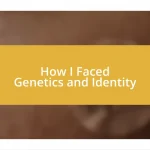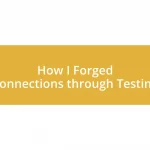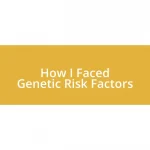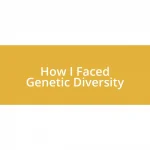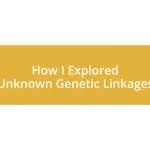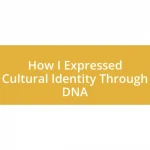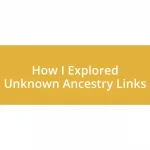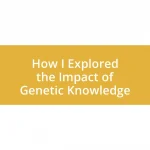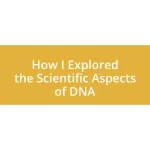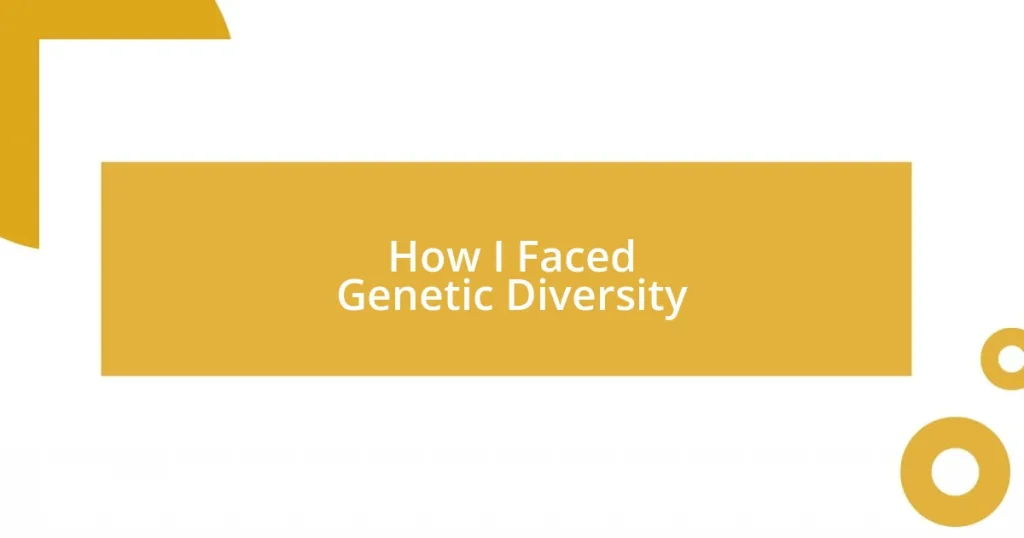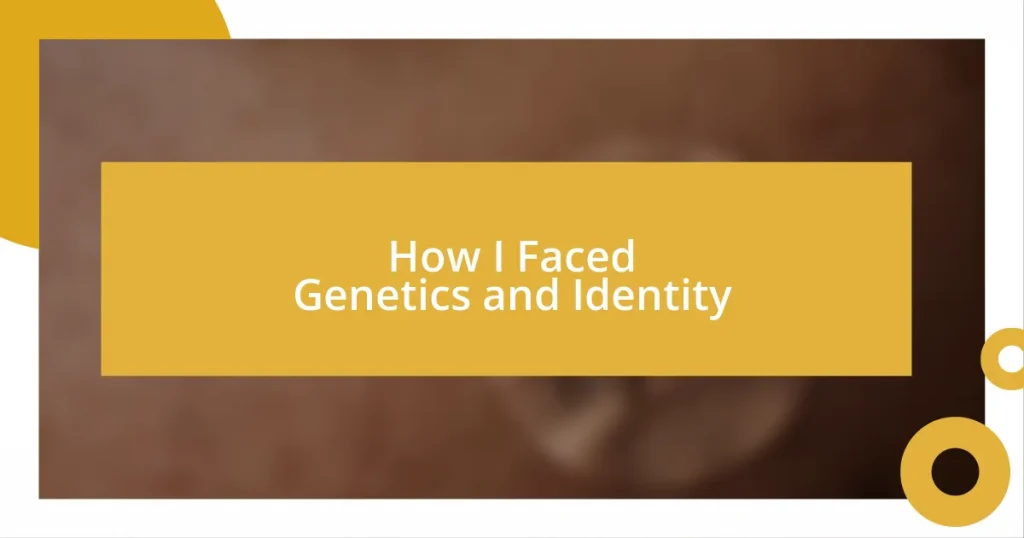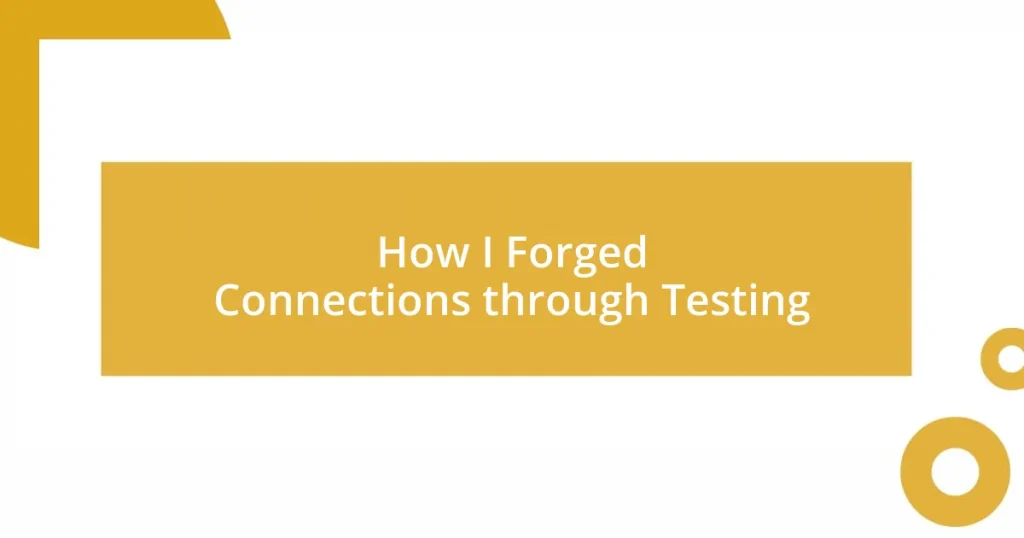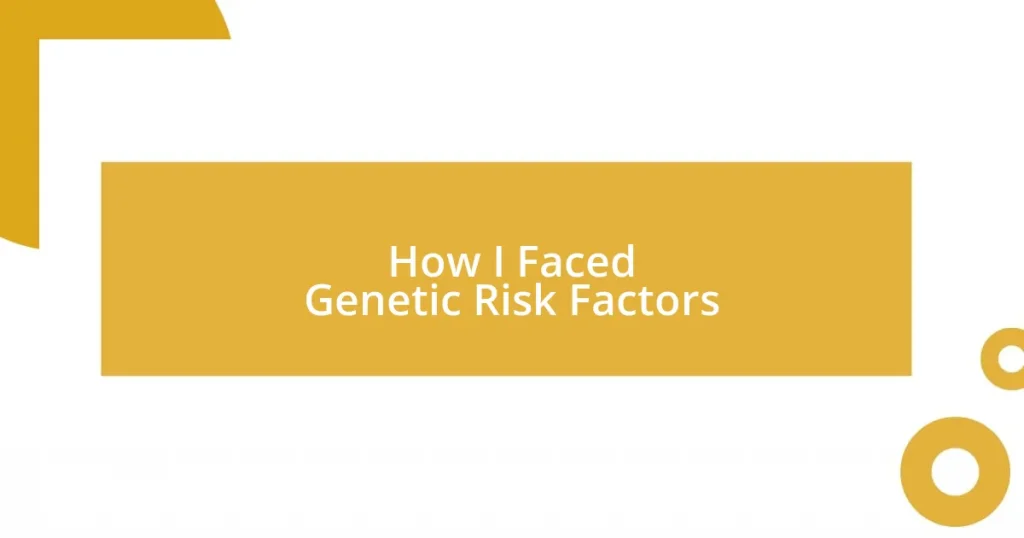Key takeaways:
- Understanding genetic diversity is crucial for food security, personalized medicine, and healthcare advancements.
- Personal experiences with genetic challenges foster empowerment through knowledge, community, and shared narratives.
- Connecting with diverse communities and educational programs enhances appreciation for genetic uniqueness and encourages advocacy.
- Future advancements in genetic technology, like CRISPR, can revolutionize healthcare, necessitating ethical considerations and community engagement.
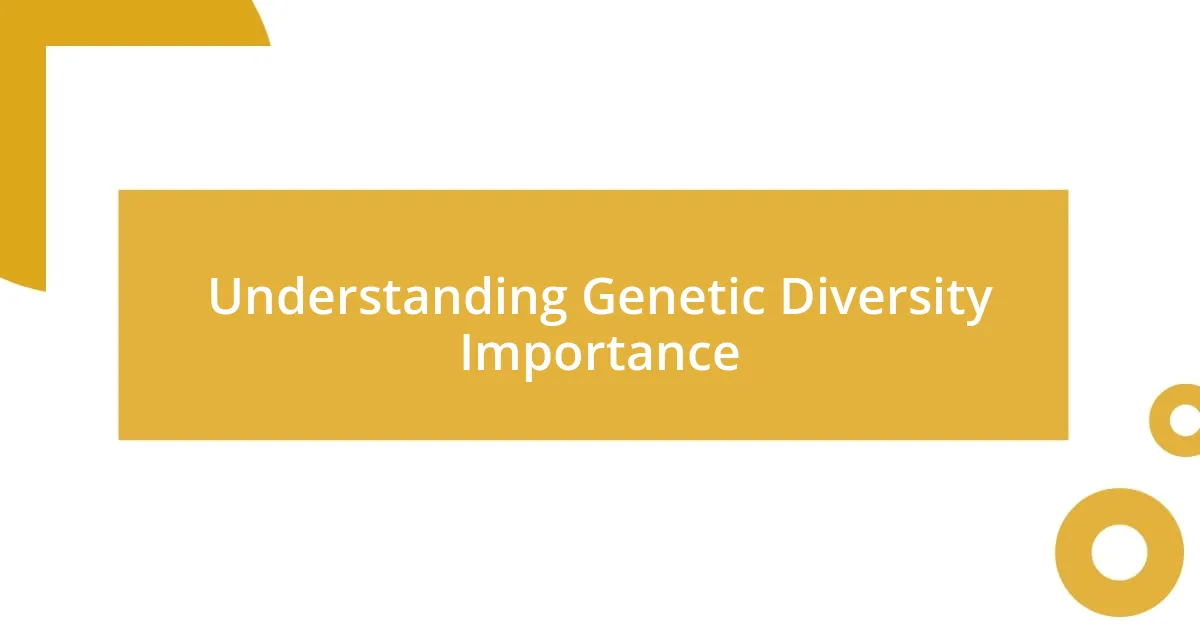
Understanding Genetic Diversity Importance
Genetic diversity is a treasure trove of possibilities for any species, including us. I remember a moment in my biology class when we discussed the resilience of crops in changing climates. It hit me then: without genetic diversity, our food supply could be at risk. Isn’t it astonishing how a variation of just a few genes can determine whether a plant thrives or fails under stress?
When I think about the great variety in human genetics, I feel a deep admiration for our shared humanity. Each unique trait adds to the tapestry of our society, shaping our cultures, preferences, and abilities. Imagine if we all looked, acted, and thought the same. Wouldn’t the world feel incredibly dull?
Consider how personalized medicine is evolving due to our understanding of genetic diversity. I often think about my grandfather who battled a rare illness; his treatment plan was tailored to his unique genetic makeup. This experience emphasizes how our differences can lead to specific, effective solutions, signaling that embracing genetic diversity isn’t just important; it’s essential for advancing healthcare.
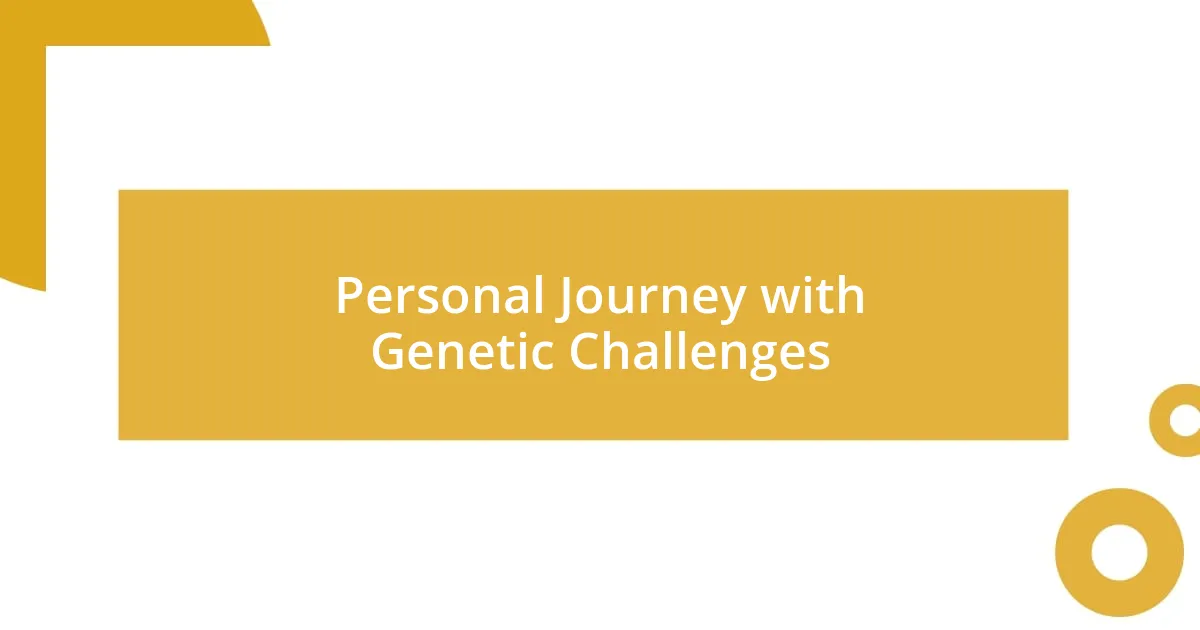
Personal Journey with Genetic Challenges
Navigating my own genetic challenges has been a journey filled with both uncertainty and discovery. I recall a time when my genetic testing revealed predispositions I’d never expected. The emotional rollercoaster that followed—worry, curiosity, and ultimately empowerment—taught me that knowledge is not only power; it’s also a crucial part of acceptance. It felt like a puzzle, each piece representing a part of my identity and health that I needed to understand.
- The initial shock of learning about my genetic risks.
- The sense of relief in having a clearer picture of my health.
- Discovering a community of others with similar experiences.
- The drive to educate myself on genetic research and advocacy.
- Learning how to advocate for my health in conversations with medical professionals.
With every step I took, I found strength in the shared narratives of others facing their own genetic hurdles. I remember sitting in a support group where individuals opened up about their genetic stories, intertwining our lives in a way that made me feel less alone. Those discussions were illuminating, helping me frame my challenges not just as burdens but as unique facets of who I am.
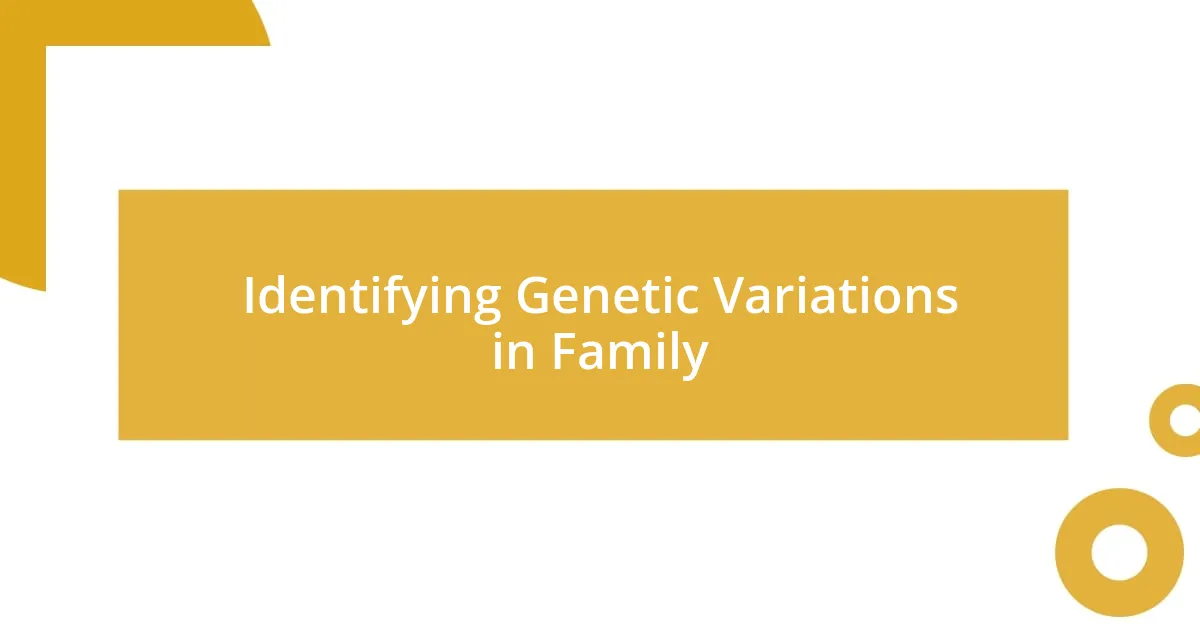
Identifying Genetic Variations in Family
Identifying genetic variations within my family was an eye-opening experience. Take, for example, the cheeky similarities between my brothers and me. I remember one family gathering where we started comparing our traits—like our curly hair and dimples—and realized these weren’t just quirks but genetic variations passed down from our parents. It sparked a lively discussion about how specific characteristics resurfaced in different branches of our family tree, making us feel connected in a deeply personal way.
In another instance, diving into our family history revealed some surprising genetic variations. I stumbled upon my grandmother’s side, discovering a history of a rare inherited condition that my siblings and I had unknowingly inherited. This revelation not only explained certain health quirks but also brought a sense of shared understanding. I felt a mix of concern and appreciation; it’s fascinating how our genes tell stories, connecting us to generations past.
Piecing together these variations felt like assembling a family quilt, each patch unique yet part of a greater whole. Reflecting on these elements, I understood that beyond the mere facts, these genetic traits encapsulate our family’s resilience and adaptability. Our differences, I’ve learned, narrate a story of survival and connection that shapes who we are today.
| Genetic Trait | Family Member |
|---|---|
| Curly Hair | Myself, Brothers |
| Dimples | All Siblings |
| Inherited Condition | Maternal Grandmother |
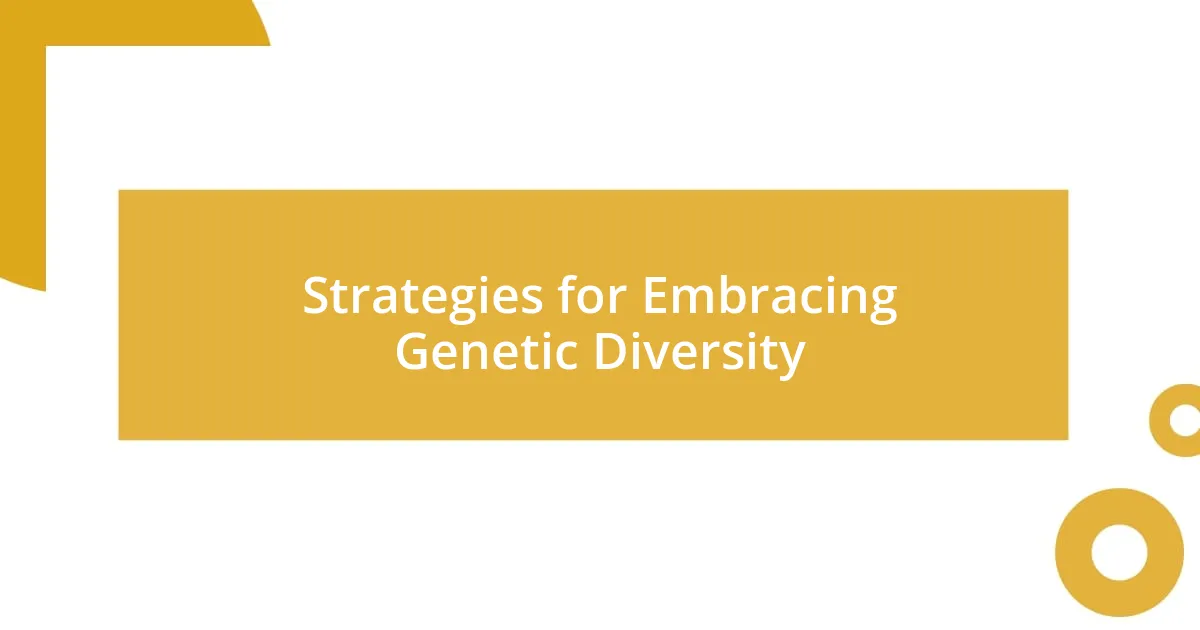
Strategies for Embracing Genetic Diversity
Embracing genetic diversity starts with education. When I first delved into the world of genetics, I was surprised by how much information was out there—books, online courses, and even podcasts. I remember listening to a podcast where experts discussed the benefits of genetic diversity in our health, and it sparked my curiosity. Have you ever considered how understanding genetic diversity can empower not only individuals but communities as well? It made me realize that by gathering knowledge, we can break down stigma and foster acceptance, making it easier for everyone to appreciate the uniqueness of their genetic makeup.
Another effective strategy is to connect with diverse communities. Finding online forums and local support groups was a game-changer for me. Sharing my journey with others who faced similar struggles created a sense of belonging and comfort. I vividly recall an online forum where members shared their unique genetic experiences; it reinforced the notion that there’s strength in our differences. Have you ever felt that sense of connection with others who “get” what you’re dealing with? Those shared stories painted a broader picture of resilience, encouraging me to embrace my own genetic narrative.
Lastly, I believe in advocating for representation in genetics research. Participating in studies or supporting initiatives that focus on diverse populations can significantly advance our understanding of genetic traits. Once, I joined a local research project that aimed to include underrepresented groups in genetic studies. It felt rewarding to contribute to a cause that not only benefited my community but also helped improve overall health outcomes. How often do we think about the impact our participation could have? Each step we take can lay the groundwork for a more inclusive future in genetic science and awareness.
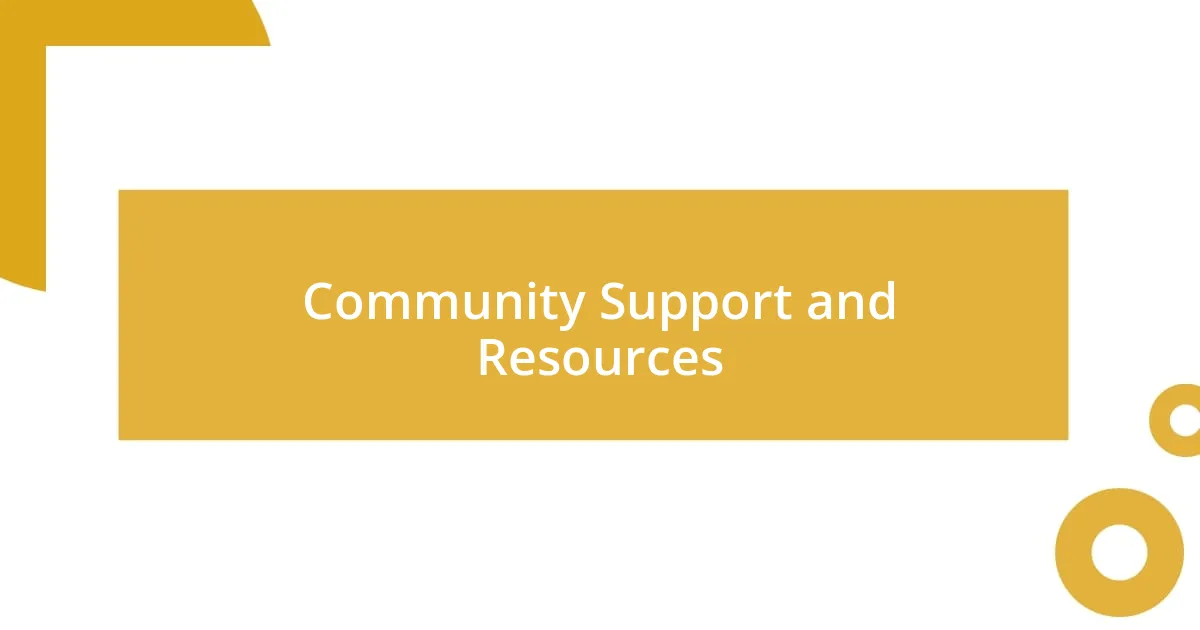
Community Support and Resources
When exploring community support, I found incredible value in local health organizations. They often offer workshops and support groups tailored to those dealing with genetic diversity. I vividly remember attending a workshop where we discussed not only health implications but also how to nurture our unique identities. It was comforting to share my story among people who truly understood my experiences—have you ever been in a room where everyone resonates with your journey? Those moments of connection were priceless.
Additionally, I discovered a plethora of online resources dedicated to genetic diversity. Websites filled with personal narratives and expert advice became my go-to for understanding and acceptance. One particular blog touched my heart, as it featured a series of interviews with individuals embracing their genetic uniqueness. As I read their stories, I felt a sense of camaraderie. It emphasized how we can lean on the strength of others while navigating our own paths—don’t you think it’s powerful when we see parts of ourselves reflected in others?
Moreover, community initiatives like awareness campaigns played a pivotal role in shaping my perspective. For instance, when my local community organized a genetic health fair, I participated and shared my experiences with others. Meeting people who united in the spirit of acceptance made me realize the importance of collective empowerment. It prompted me to ask myself, how can we champion diversity if we don’t lift each other up? That day, I learned that our shared struggles could forge a robust support system, turning personal challenges into collective strength.
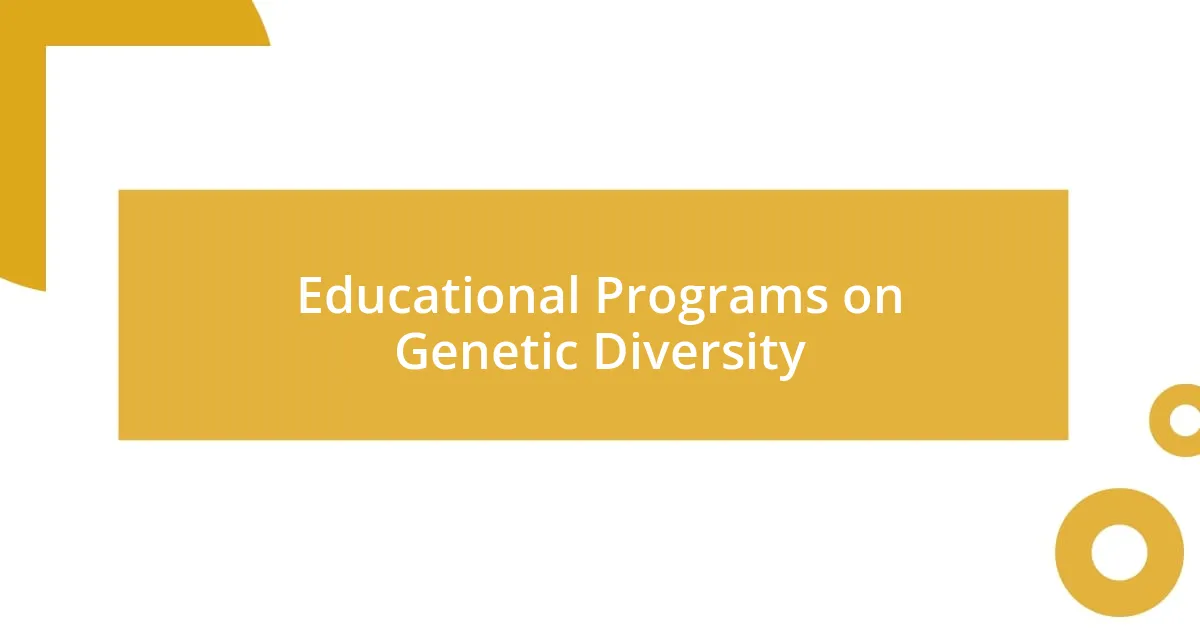
Educational Programs on Genetic Diversity
Educational programs on genetic diversity have become critical resources for individuals and communities alike. I remember my first experience at a community seminar focused on genetic health—it was eye-opening to see how various educational initiatives helped dispel myths and spark conversations. Have you ever felt the power of knowledge changing someone’s perspective? It was inspiring to witness participants open up, realizing how understanding their genetic differences could foster not just personal growth but also a sense of belonging.
In my journey, engaging in school projects related to genetic diversity truly transformed my understanding. At one point, I took part in a project where we examined the benefits of diverse genetic traits in agriculture. This experience taught me that genetic diversity isn’t just about human health; it plays a significant role in food security and environmental resilience. I’d often think, what if more schools adopted such projects? The knowledge we gain can empower future generations to appreciate the richness that diversity brings to our ecosystems.
Finally, I’m particularly passionate about online courses dedicated to genetic diversity. I completed one that didn’t just teach the science behind genetics but emphasized its social implications, challenging me to think deeply about how these differences shape individual experiences. After each module, I found myself reflecting on how these ideas could be shared within my community. Have you ever thought about how a single course could ripple into broader community dialogues? It’s through these enlightening experiences that we not only grow personally but also help bridge gaps in understanding among diverse populations.
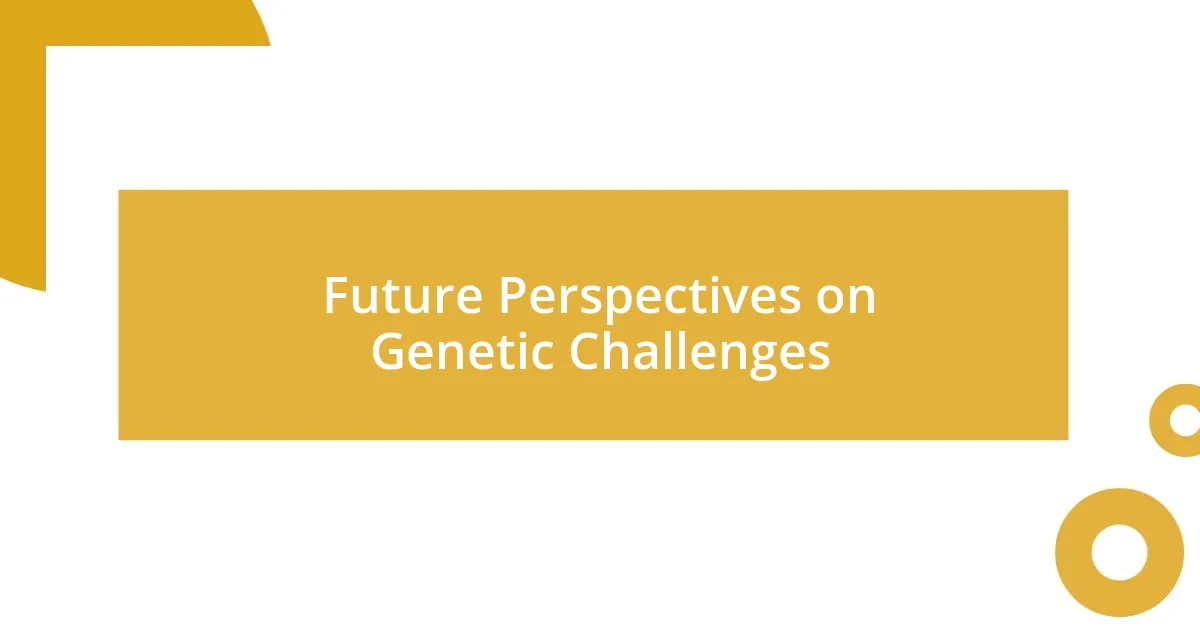
Future Perspectives on Genetic Challenges
Imagining the future of genetic diversity, I often ponder the technological advancements in genomics. For instance, the rise of CRISPR and similar gene-editing technologies could revolutionize how we address genetic inheritance issues. Have you ever thought about the ethical implications of altering genes? I believe we need to navigate these waters thoughtfully, considering not only the scientific benefits but also the societal impact of our choices.
As I reflect on my journey, I can’t help but think about the potential for personalized medicine that caters to our unique genetic makeup. I once attended a lecture where the speaker emphasized how treatments could be tailored to individuals based on their genetic profiles. This concept excited me—imagine a world where healthcare is customized to fit each person perfectly! It made me wonder how healthcare systems can adapt to this shift, ensuring equitable access for everyone.
Looking ahead, community engagement will be crucial in addressing genetic challenges. I recall a panel discussion where experts and community members shared experiences, creating an open dialogue around stigmas and misconceptions. It was powerful to feel the energy in the room as collective wisdom sparked new ideas. How can we harness this energy to advocate for inclusive policies? My heart tells me that by continuing to foster these conversations, we can cultivate an environment where genetic diversity is celebrated, rather than feared.
